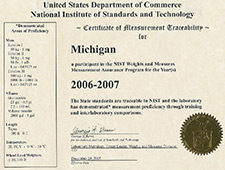Home | Glossary | Resources | Help | Contact Us | Course Map
Aviso de archivo
Esta es una página de archivo que ya no se actualiza. Puede contener información desactualizada y es posible que los enlaces ya no funcionen como se pretendía originalmente.
Standards, NIST Traceability, and Laboratory Accreditation
Standards used in measuring weight and dimensions in an accredited laboratory should be traceable to and fall within the tolerances of a standard maintained by the National Institute of Standards and Technology (NIST), a part of the Technology Administration under the United States Department of Commerce.
Click here to visit the NIST website
Vendors selling items with measurements falling within the specified tolerances can apply for NIST certification. NIST can provide the vendor with a Certificate of Traceability, documenting and supporting the unbroken chain of comparisons of measurements back to the NIST standard.
Click here to visit the NIST definitions
NIST traceable standards may or may not be used for forensic firearms work in a given laboratory. However, firearm examiners can expect increasing challenges relating to NIST standards and traceability in the future.
The momentum of these challenges is growing and is a direct outgrowth of such factors as the these:
- Widespread recognition of a need for accreditation of forensic laboratories. Laboratory accreditation can be achieved through the following accreditation bodies and their respective programs:
- American Society of Crime Laboratory Directors / Laboratory Accreditation Board (ASCLD/LAB).
- ASCLD/LAB Legacy: The original accreditation program offered by this agency. This program will be phased out in favor of ASCLD/LAB ISO.
- ASCLD/LAB ISO: Based on ISO/IEC 17025:2005 the international standard developed by the International Organization for Standardization (ISO) applicable to forensic laboratory accreditation.
- Forensic Quality Services (FQS).
- FQS ISO: Also based on ISO/IEC 17025:2005.
- American Society of Crime Laboratory Directors / Laboratory Accreditation Board (ASCLD/LAB).
- Support of accreditation programs by the Association of Firearm and Tool Mark Examiners
Click here to visit the AFTE Accreditation Advisory Committee Duties and Procedures.
- Emphasis placed on formalized laboratory technical protocols by professional groups, such as the Scientific Working Group for Firearms and Toolmarks (SWGGUN).
Additional Online Courses
- What Every First Responding Officer Should Know About DNA Evidence
- Collecting DNA Evidence at Property Crime Scenes
- DNA – A Prosecutor’s Practice Notebook
- Crime Scene and DNA Basics
- Laboratory Safety Programs
- DNA Amplification
- Population Genetics and Statistics
- Non-STR DNA Markers: SNPs, Y-STRs, LCN and mtDNA
- Firearms Examiner Training
- Forensic DNA Education for Law Enforcement Decisionmakers
- What Every Investigator and Evidence Technician Should Know About DNA Evidence
- Principles of Forensic DNA for Officers of the Court
- Law 101: Legal Guide for the Forensic Expert
- Laboratory Orientation and Testing of Body Fluids and Tissues
- DNA Extraction and Quantitation
- STR Data Analysis and Interpretation
- Communication Skills, Report Writing, and Courtroom Testimony
- Español for Law Enforcement
- Amplified DNA Product Separation for Forensic Analysts


